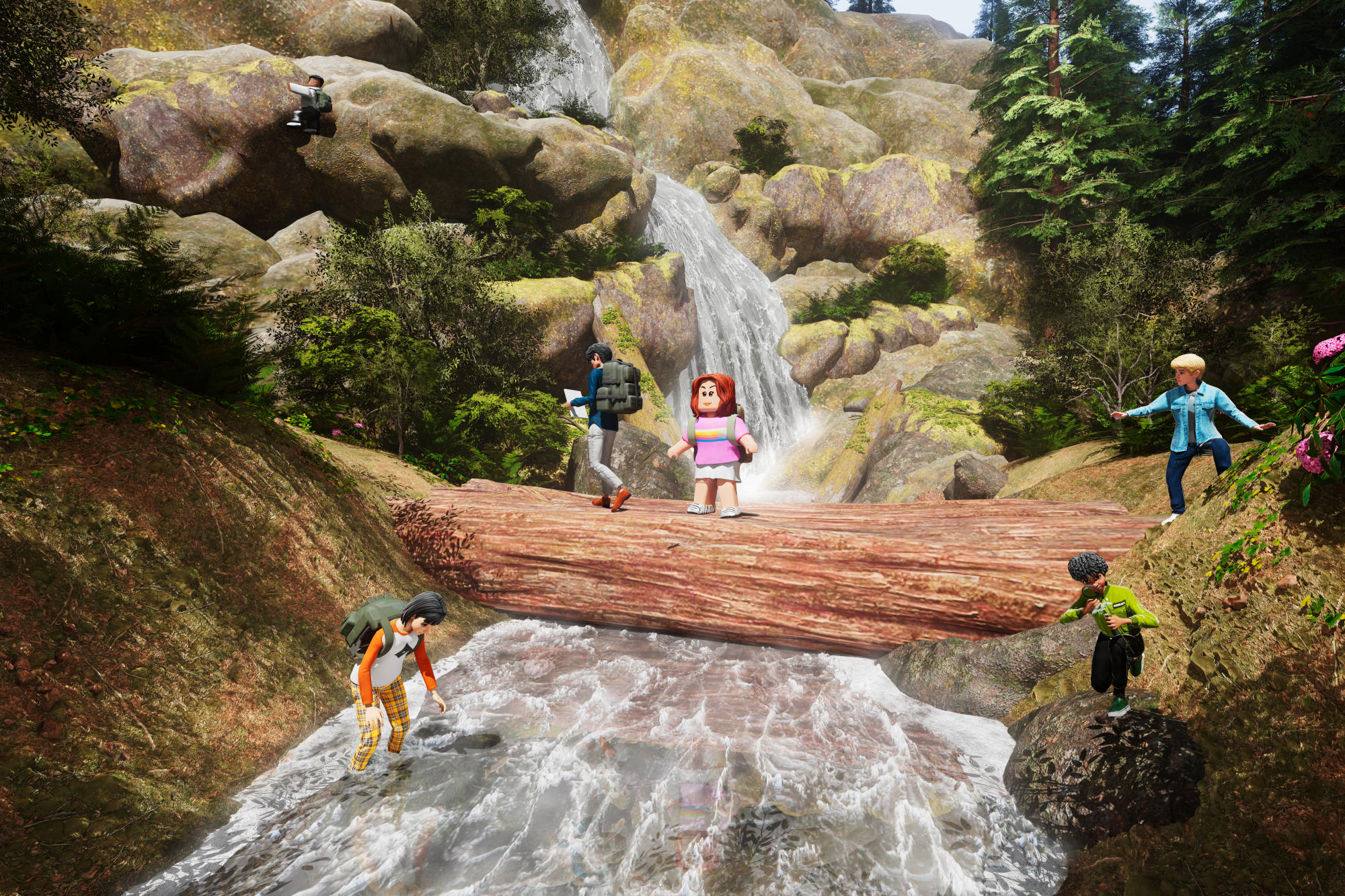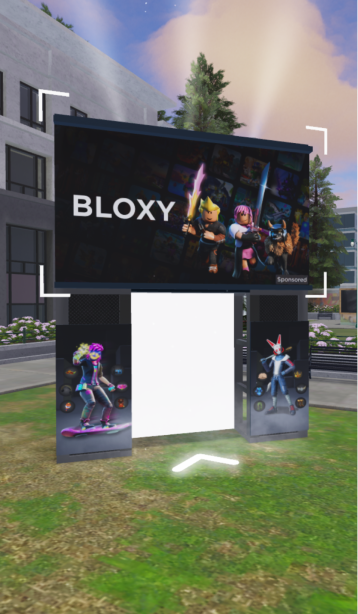Roblox outlined a vision for the future of its busy social gaming platform on Friday, incrementally ushering its community into a new era that might not always resemble what’s come before.
At RDC, its annual developer event, the company highlighted new features designed to improve the platform, with a focus on expanding the platform to offer more sophisticated experiences to age groups beyond the 13-and-under crowd that’s long been its bread and butter. Now, Roblox will implement age guidelines to make clear lines between content that’s appropriate for all users, those nine years old or up or only those above the age of 13.
Some new experiences, like interactive video billboard ads and portals that transport the user into a branded experience, will be limited to the oldest age group. Other new features, like proximity-based voice chat, are also closed off to kids below the age of 13 for safety reasons. The company previously announced an age verification system that would make experiences geared toward older audiences possible. The company says that experiences designed for users over the age of 13 could include moderate violence and realistic blood, while games intended for younger users are limited to “light” violence.
In its last earnings call, the company revealed that people age 17 to 24 make up the fastest-growing slice of its current audience, a fact that’s sure to be shocking to anyone who’s dipped a toe into its endless candy-colored portal of simple games and virtual hangout spaces.
Roblox grew its daily active users by about 10 million in the last year, so the core experience is clearly working for a lot of people — even if its appeal and aesthetic is largely incomprehensible to most adults. That modest growth might not be enough for a company driven to outgrow its image and attract an older demographic.
To expand the platform along with its user base, developer community and, increasingly, the brands interested in setting up shop there, Roblox wants to deepen its experiences across the board. While Roblox offers overwhelming breadth, it’s not exactly known for depth. But by layering on improvements to avatars, chat and even its physics engine, Roblox plans to evolve. Most things on the platform still sort of look that one way for now, but increasingly the old will mix with the new — and so too will the stubby Lego-like avatars mix with their longed-limbed brethren.

Image Credits: Roblox
In the last year, the company announced that it would overhaul its simplistic graphics with new in-game textures, push toward realism with normally proportioned avatars wearing more realistic virtual clothing, roll out improvements to its toolkit for hobbyist creators and professional game developers alike, tinker with voice chat and lifelike in-game audio and introduce an age verification system that would help it gate some forthcoming advanced features away from its core group of young users.
In 2020, Roblox bought Loom.ai, a startup that created lifelike digital avatars with facial animations. Now, it’s experimenting with video-capture to enable facial and even full-body animations, which feels like realism overkill for now, though could one day become more common beyond iMessage’s animated unicorn and shark faces.
“It’s very cool because now you start adding things up, facial animation and communication makes 3D immersive communication 10x more realistic than it used to be,” Roblox Chief Product Officer Manuel Bronstein told TechCrunch.
Creators could capture Fortnite-like dances in the future, selling them through the in-game economy. “The explosion of self expression will be huge,” Bronstein said.
Getting around in Roblox

Image Credits: Roblox
As Roblox layers more depth into its graphics, games and tools, it’s also working to build more literal depth into the platform itself with tunnels that transport users from one experience to another. Advertisers get to play around with the toy first through “immersive ads” — in-game portals that users can walk through to teleport into branded experiences. Roblox is also introducing ad billboards that display videos when interacted with.
Eventually, the same portal design could expand outward, transforming Roblox from a 2D experience with a flat mobile-style app menu to a more immersive 3D space. Instead of selecting the little square on the screen that represents the game you’d like to pop into, you could just walk through the right portal from a central space.
“Today when you’re inside an experience, you need to leave the experience to go to another experience,” Bronstein told TechCrunch. “And I think that portals is going to be a way as an app to actually do that navigation without leaving the experience.
“We have some interesting ideas that, again, these are more in the future, whether you will have your own personal portal, whether when you open them maybe you can see your favorite experiences and navigate to them. So that we can make it more continuous, without having to interrupt from going from one experience to the other. But, I think for us, this is going to be our first iteration.”
This kind of thing is already used widely in VR experiences and other proto-metaverses like the Epic Games hit Fortnite and Core, another game creation platform running on Epic’s Unreal engine that starts players in a central lobby full of portals to UGC content.
Discovery and community
Because Roblox relies wholly on user-generated content, it’s also grappling with some of the same issues that other social platforms have stumbled over in recent years. On the developer/creator side, that means making it easier for users to discover Roblox experiences off the beaten path, beyond the mega-hit games that rack up billions of visits.
Bronstein told TechCrunch that that entails “huge investments” in search and discovery, some of which are already underway. “If you’re a new creator, or if you have a new experience, how does new content get discovered?” Bronstein said. “How do you find your first 10 users, 100 users, 1,000 users? … We’re going to put a lot more emphasis in making sure that new content has a very first shot at being discovered.”
According to Bronstein, those improvements won’t be visible at once and they aren’t a single silver bullet, but the company will prioritize changes to its algorithm to improve the discovery experience. “This is a collection of tweaking and tuning the algorithm,” Bronstein said. “But it’s something that is very important for our community to hear about.”
Roblox also plans to build more experiences outside of its… experiences. The company offers some basic group functions that allow users to follow their favorite developers, but those features are pretty shallow for now. With Roblox’s acquisition of Discord competitor Guilded a year ago, the company plans to layer in more community-building services that its users currently find elsewhere on services like Twitter and Discord. Bronstein believes that many Roblox developers would rather have those tools in-house and much nearer to where the content itself lives.
“One of the things that we have learned from our developers is that they always want to be able to engage with their community, they want to build communities around their content so that when they have an event, when they have an update, when they they have a new experience, they can communicate,” Bronstein said. “What we want to do is start bringing a lot of that functionality closer… so we’re going to start building those communities inside Roblox.”
Like all of the other changes coming to the platform, users will notice these new community features integrated slowly over time — not all at once. Roblox might mostly look and feel the same for now, but a lot of change is just over the horizon, inching closer.
Roblox inches toward a deeper, more mature vision for the metaverse by Taylor Hatmaker originally published on TechCrunch
DUOS





